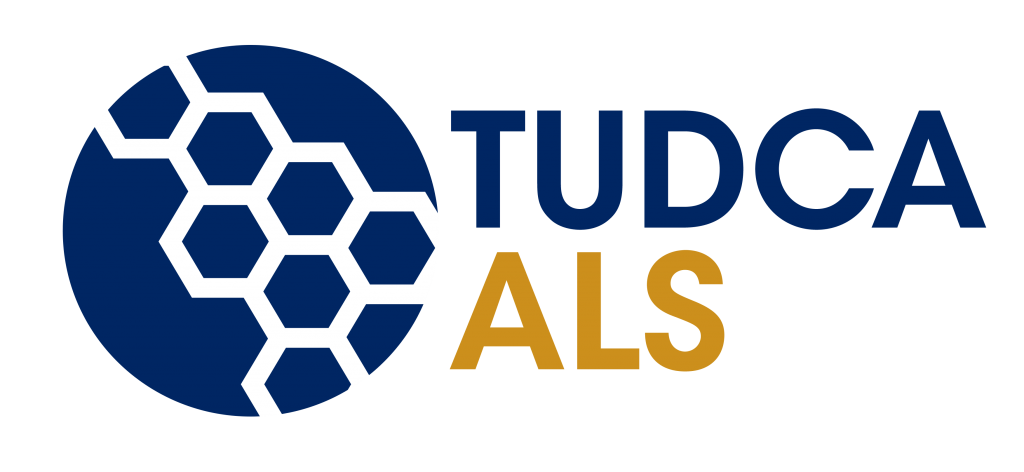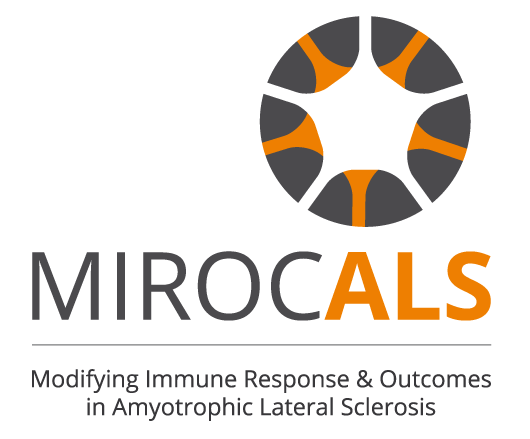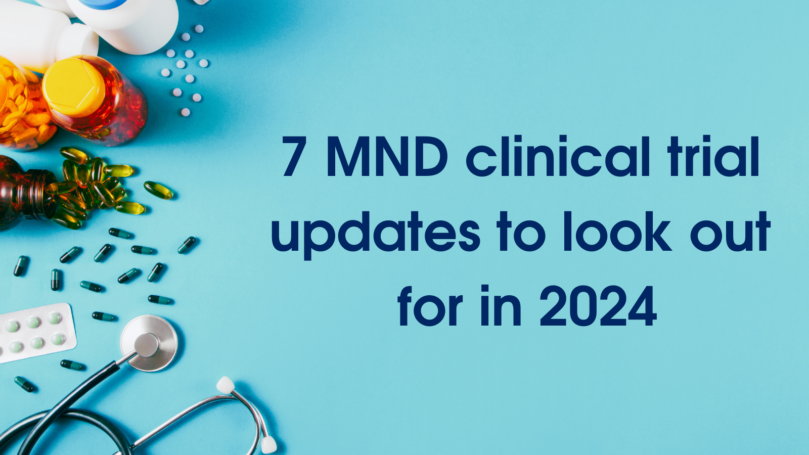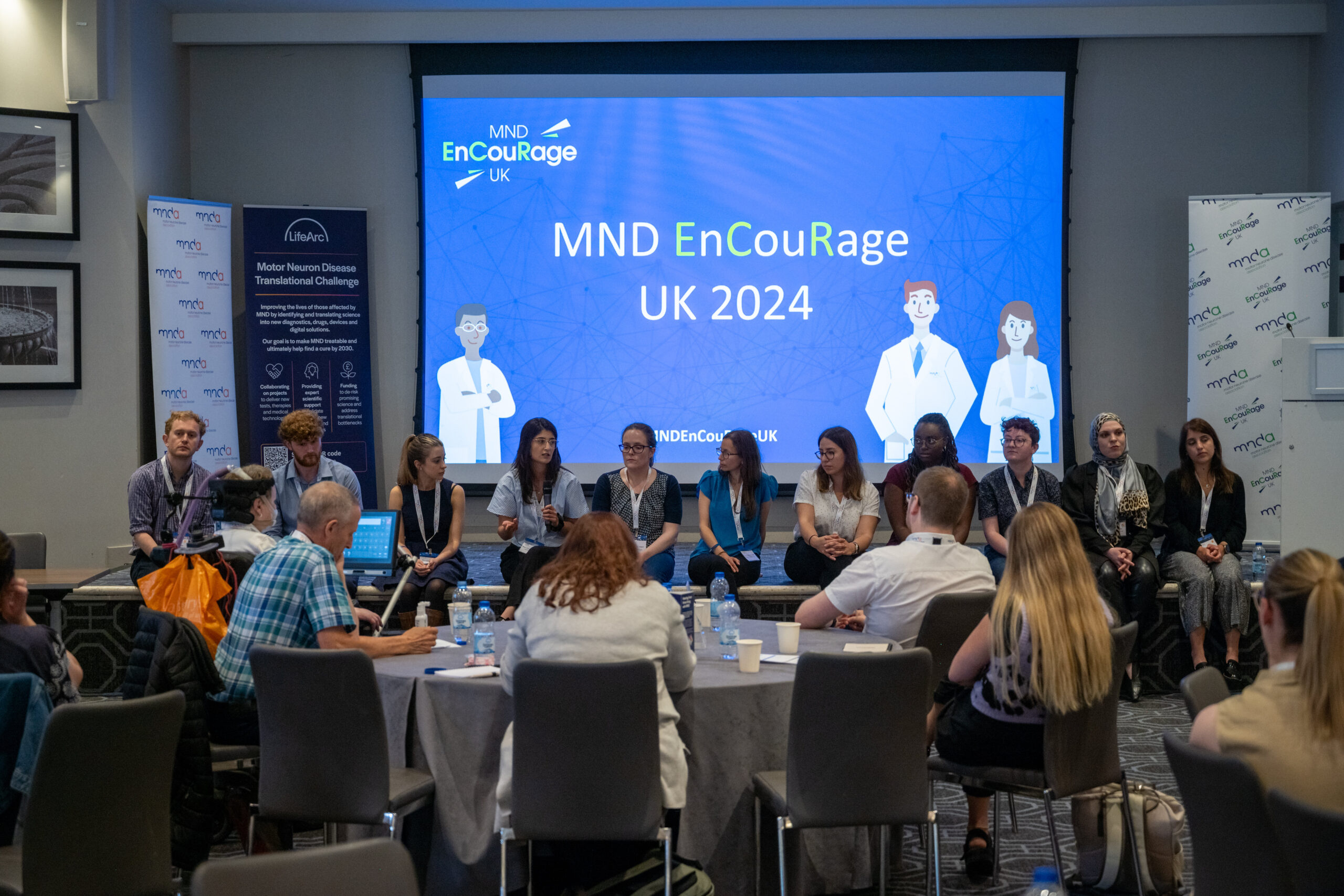Over the past couple of years, the pace of MND research has continued to increase. In the last year alone, we saw an increase in the number of MND clinical trials recruiting worldwide. During 2023 we heard some promising results from early trials and Tofersen (Qalsody), a treatment for SOD1 MND, was approved for use in the US. 2024 looks to continue this momentum, with a number of clinical trials results and decisions from regulatory authorities around the world expected. In this blog we will highlight some of the most anticipated updates from MND clinical trials we are expecting in 2024.
Tauroursodeoxycholic acid (TUDCA-ALS)
Status: Top-line results expected 2024

Tauroursodeoxycholic acid (TUDCA) is a substance which is naturally produced in the body in small amounts and is one half of the combination drug AMX0035. TUDCA is licensed in the US to treat some diseases affecting the liver but previous research has suggested that it may also be beneficial for treating neurodegenerative diseases, like MND. It is thought that TUDCA might dampen the action of a stress chemical which is known to trigger a chemical response that leads to the death of damaged cells. The TUDCA-ALS trial, assessing the safety and efficacy of the substance, is fully recruited and top-line results are expected to be released in 2024. More information about this trial can be found here.
What are top-line results?
Top-line results are the first reported results from a clinical trial. These results give an initial inclination if the treatment is showing signs of benefit and is safe to use. Further analysis and publication of the full results is still required to determine the overall outcome of the trial.
AMX0035 (PHOENIX)
Status: Top-line results expected 2024
AMX0035 (known as Albrioza in Canada and Relyvrio in the US) is a combination therapy, made up of two compounds – TUDCA (Tauroursodeoxycholic acid) and Sodium Phenylbutyrate (PB). Both of these drugs are already licensed to treat other conditions. TUDCA and PB target MND in slightly different ways. PB reduces stress on the endoplasmic reticulum, whilst TUDCA blocks key cell death pathways. This dual approach is believed to improve the survival of neurones.
A previous phase 2 clinical trial showed encouraging results, suggesting that over the 2-year trial those who started AMX0035 earlier, lived longer than those who started the treatment 6-months later. The data from this clinical trial was used to gain regulatory approval in the US and Canada, however European regulators denied approval. A phase 3 trial, called PHOENIX, is tested AMX0035 in a larger cohort of people with MND over a longer period of time. Top-line results are expected to be released in 2024. More information about this trial can be found here.

RELATED POST
Blog | 30 September 2023 | Charlotte Roy
What does the FDA approval of AMX0035 mean for the UK MND community?
Interleukin-2 (MIROCALS)
Status: Full results expected 2024

Inflammation is thought to influence the spread of damage throughout the brain and spinal cord and this has been linked to the speed of progression in MND. Our bodies can help to control inflammation through a type of immune system cell called a Regulatory T Cell (Treg). Research has shown that Interleukin-2 (IL-2) can help to control Tregs and low doses have been shown to increase the number and function of Treg cells in the blood. MIROCALS (Modifying Immune Response and OutComes in ALS) is a phase 2 trial which investigated the impact of IL-2 on disease progression and survival.
Topline results from the trial were announced in 2022, which suggested that IL-2 may have a potential survival benefit for certain people living with MND. You can read about these results here. Since these topline results were announced, the researchers have been working to complete the full analysis of the data. The full results are expected to be published in 2024.
SAR443820 (HIMALAYA)
Status: Top-line results expected late 2024
In MND, levels of an enzyme, called RIPK1 (receptor-interacting protein kinase 1), are significantly increased in the spinal cord. These increased levels are thought to be associated with abnormal activity of cells that support motor neurons and nerve cell death. SAR443820 is designed to reduce the levels of RIPK1 and hopefully slow disease progression. The HIMALAYA trial, which is testing the safety and efficacy of SAR443820, is fully recruited and top-line results are expected in late 2024. More information about the trial can be found here.
Terazosin (TRUST)
Status: Recruiting, but top-line results expected late 2024
Terazosin is a drug which is already licensed to treat high blood pressure and benign prostatic hyperplasia. Early research in the laboratory has shown that, in models of MND, Terazosin protected motor neurons and improved their survival. These results led to a small feasibility trial to investigate the benefits of Terazosin in people with MND.
Researchers will monitor the levels of a marker of nerve damage, called neurofilament light chain, during the trial. Research has shown that neurofilament light chain is raised in people with MND, as there is lots of damage to motor neurons. A reduction in neurofilament light chain could suggest less damage is happening to motor neurons and that a treatment is having a beneficial effect. The trial is expected to finish recruiting from the Oxford MND Care Centre in March, with top-line results announced by the end of the year. These results will determine if Terazosin should be further tested in larger clinical trials.
EXPERTS-ALS
Status: Recruitment expected to start Summer 2024

Researchers in the UK have built on the concept of using neurofilament light chain to quickly identify promising drugs by creating the EXPERTS-ALS (EXPErimental medicine Route To Success in ALS) platform. EXPERTS-ALS will rapidly test drugs in people living with MND to assess their potential to slow MND progression. It is hoped that testing potential treatments in people with MND earlier might mean that drugs chosen to progress to larger clinical trials in the future are more likely to show benefit and have a higher chance of success.
The platform will test three drugs at any one time and, to start with, will be drugs that are already approved for other diseases and known to be safe. Researchers will measure levels of neurofilament light chain throughout the trial. If the treatment is found to significantly reduce levels of neurofilament light chain, potentially suggesting early signs of benefit, the drug will be prioritised for further testing. Recruitment for EXPERTS-ALS involve 11 MND centres across the UK and is expected to start in Summer 2024.

RELATED POST
Blog | 21 June 2023 | Eleanor Green
EXPERTS-ALS: a new drug testing platform from the UK MND Research Institute
Tofersen
Status: European regulatory decision expected 2024
Tofersen is a gene therapy which is designed to treat SOD1 MND, which account for around 2% of all cases of MND. People living with MND who have a mistake in the SOD1 gene produce faulty SOD1 protein, which is toxic to motor neurons. Tofersen targets the genetic instructions for the faulty SOD1 protein, stopping it from being produced. A phase 3 trial of Tofersen, called VALOR, showed that Tofersen lowered levels the faulty SOD1 protein, lowered levels of neurofilament light chain (a marker of nerve damage), and increased survival.
The results from the VALOR trial, especially the reduction in neurofilament light chain, led to the approval of Tofersen (Qalsody) in the US. The European Medicines Agency (EMA) is now reviewing the data and a decision is expected in 2024. Read more about what approval looks like for the UK in a previous blog.
Ongoing clinical trials
Status: Recruiting
There are currently 6 MND clinical trials recruiting across the UK. Find out more about these trials including, where they are recruiting, how the drug is thought to work and the latest updates from the trial on our website.

RELATED TOPIC
Website | Clinical Trials
Find out about treatment trials recruiting in the UK
We know keeping up to date with clinical trial news is very important to the MND community so we endeavour to share the latest updates through our Twitter/X account, research monthly newsletter and latest news page.






